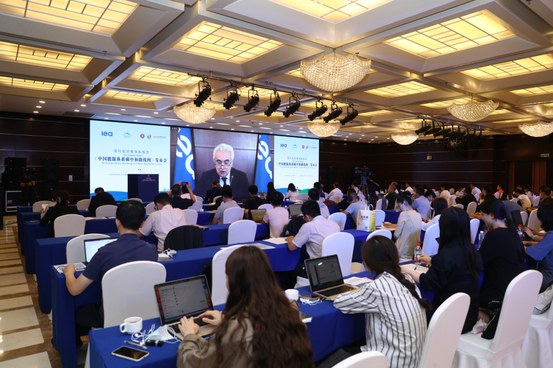IEA Report Lays Out Chinese Energy Sector’s Roadmap to Carbon Neutrality
On September 29, 2021, the International Energy Agency (IEA), Energy Foundation China (EF China), and the Institute of Energy at Peking University released An Energy Sector Roadmap to Carbon Neutrality in China. More than 100 experts from industries, energy companies, and financial institutions attended the launching event in person, along with 650,000 viewers who watched via a streaming service.
With support from EF China, this report lays out a pathway for achieving carbon neutrality in China’s energy sector, while exploring how this transition meets China’s broader development goals such as promoting prosperity, enhancing technological leadership, as well as shifting to innovation-based growth.
Fatih Birol, IEA’s Executive Director of the International Energy Agency, Ji Zou, CEO and President of EF China, and Zhijun Jin, Dean of the Institute of Energy at Peking University delivered opening speeches at the event.
Dr. Birol said that China, as the biggest energy consumer and producer in the world, could also be a pioneer in clean energy and establish a more sustainable, reliable, and inclusive energy future. The country’s low carbon transition would bring greater socio-economic benefits to China and advance the global fight against the climate crisis. China’s efforts for carbon neutrality would inspire innovation in many areas and drive substantial reductions in fossil fuel emissions in the coming decades, he said.

Fatih Birol, Executive Director of the International Energy Agency, gave his speech at the event releasing a major IEA-Peking University-EF China report on September 29, 2021.
According to Ji Zou, this report was the first official collaboration of many to come between IEA and EF China. It presented a new growth model that brings employment, investment, and consumption opportunities and contains risks from the energy transition. With insights from experts from IEA and China, this report set up an example for future international cooperation, which was a key to achieving global climate targets, he said.

Ji Zou, CEO and President of EF China, gave his speech at the event releasing a major IEA-Peking University-EF China report on September 29, 2021.
Professor Jin said that China had a long way to go before achieving carbon neutrality, while innovation and clean energy industries would be the key. The energy sector roadmap proposed in this report was very valuable for China’s ongoing efforts on carbon emissions peaking and carbon neutrality, he said.

Zhijun Jin, Dean of the Institute of Energy at Peking University, gave his speech at the event releasing a major IEA-Peking University-EF China report on September 29, 2021.
Timur Guel, IEA’s Head of the Energy Technology Policy Division presented findings of the report. According to the report, achieving early carbon neutrality in China demands a rapid and profound transformation of the energy sector, with three main drivers of emission reductions: improvement of energy efficiency, expansion of renewables, and reduction of coal use. The report also examines the effects of a faster transition and the socio-economic benefits beyond those associated with reducing the impact of climate change. For instance, under the report’s Accelerated Transition Scenario, approximately one million additional jobs will be created through the emergence and strong growth of innovative technologies, such as hydrogen and carbon capture.

Timur Guel, IEA’s Head of the Energy Technology Policy Division, presented findings of a major IEA-Peking University-EF China report at the event releasing it on September 29, 2021.
Sha Fu, EF China’s Director of Low Carbon Economic Growth and Director of Strategy and Planning chaired a panel discussion. Panelists included Jiahua Pan, Member of the Chinese Academy of Social Sciences, Shiji Gao, Director-General of the Institute for Resources and Environmental Policies, Development Research Center of the State Council, Qimin Chai, Director of Strategic Planning Department, National Climate Change Strategy Research and International Cooperation Center, Liping Jiang, Vice President of the State Grid Energy Research Institute, Qiang Zhang, Vice Chair of the Department of Earth System Science, Tsinghua University, and Araceli Fernandez Pales, IEA’s Head of Technology Innovation Unit. They covered topics such as new jobs with carbon neutrality targets, the coordination between climate targets and economic growth, challenges and solutions of the power system transformation, policy options for coordinating near-term and long-term development, and clean retrofits of existing infrastructure.

Panelists at the event releasing a major IEA-Peking University-EF China report on September 29, 2021.
In the future, EF China will continue focusing on China’s energy transition pathways toward early carbon peaking and early neutrality, with more research in this important topic. EF China will also cooperate with international research institutions to present China’s perspectives and share experiences here with the world.



